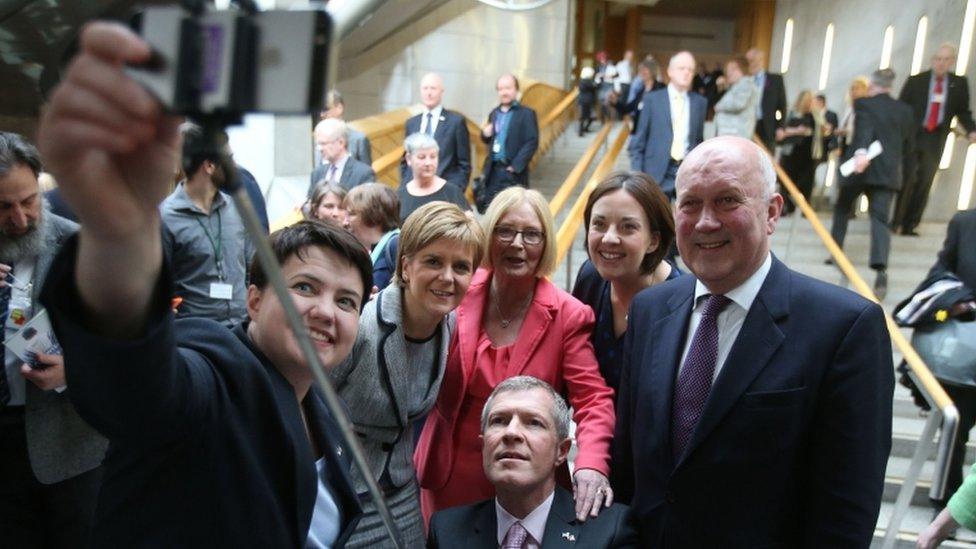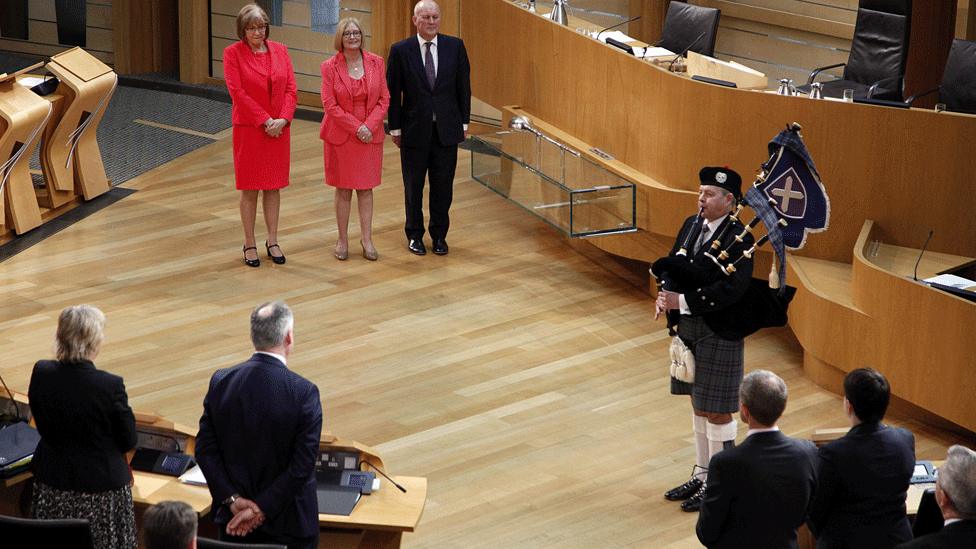FMQs: Non-tearful farewells
- Published

It is time to confess. A long time ago in a galaxy far, far away, I used to help run the annual sweepstake as to which MP would be the first to demand the recall of the Westminster Parliament during the summer recess.
Tam Dalyell was excluded on the basis that he would routinely urge recall before the recess had started, so eager was he to sustain his pursuit of proclaimed Ministerial malfeasance. (As I have said before, I am a huge admirer of Tam's parliamentary persistence.)
Tam apart, other MPs featured in the sweepie. I know, I know, it was shameful behaviour. Lampooning Westminster's ancient customs and traditions. But I was young, dear friends, I was young.
At Holyrood today, the retiring presiding officer thought a similar breach of protocol was under way. She had heard that there was a sweepstake going the rounds. And the topic in question? When she would burst into tears during her farewell oration.
Tricia Marwick steps down as Holyrood presiding officer
What could have given her that idea? Were fellow MSPs offering unctuous solicitations in a bid to start her sniffling - and so win the prize? Were colleagues playing emotional music? Grieg, perhaps, or the Wee Cooper o' Fife? Did she spot her chief executive, Sir Paul Grice, furtive onion at the ready?
No. Apparently, she deployed her intuitive knowledge of parliamentary mischief. Whatever, she resolutely refused to blub. All around the chamber, you could see MSPs silently shredding their tickets. (I jest, of course.)
The farewell to Ms Marwick was notably fond. In egalitarian fashion, it was extended to those other members who are also voluntarily departing (as opposed to those who may be sent packing by the electors.)
Decidedly the most succinct valedictory comment came from Kevin Stewart. The Aberdonian MSP glanced in the direction of the PO and opined: "A' the very best, quine."
In the middle of all this sweetness, notably acid exchanges in the final set of questions to the first minister.

MSP Stuart McMillan brought the parliament to a close
Labour's Kezia Dugdale pursued the FM over tax, accusing her once more of missing a chance to improve public services by pushing up tax. Specifically, she urged Labour's plan to increase the very top rate from 45p to 50p.
Nicola Sturgeon fought back, arguing that such a move might drive top earners out of Scotland, thus reducing the overall tax take. Such a move, she said, would be "not daring, but daft".
Ms Sturgeon had a similar exchange with Willie Rennie of the Liberal Democrats who warned that educational provision would suffer. The FM resorted to her familiar tactic of reminding Mr Rennie that his party had sustained the Tories in Westminster power during the days of the coalition. Thus, she argued, sparking austerity.
She also noted that Mr Rennie had neglected the impact of the much-debated fiscal framework which has the effect of rebalancing any rUK tax cut through a relative cash advantage for Scotland. Cash, she said, which would be productively investment.
Land reform
Ruth Davidson of the Conservatives pursued the topic of the "named person" due to be assigned to each child. Tories regard this as a prime example of over-zealous state interference.
In an interview with me for a conference webcast, Ms Sturgeon had declared that use of the system was not mandatory. She meant that it was not obligatory for parents to rely upon an intervention by the said named person.
Ms Davidson queried this - and urged the abandonment of the entire scheme. Ms Sturgeon demurred and suggested that it was available as a useful backstop for all families, given that one could never tell in advance who might need help.
For the Greens, Patrick Harvie urged more radical land reform. Each of the parties, in short, pursuing issues which will feature substantially during the campaign.
There was a droll moment towards the close. Labour's Sarah Boyack invited Ms Sturgeon to pursue a particular policy approach, post election. The FM seized upon this, with a grin, as a "vote of confidence" in her prospect of being returned to power.
Then we were off into the dry-eyed vote of thanks. At the close, the skirl of the pipes in the chamber as MSP Stuart McMillan displayed his considerable skill on the instrument.
His first choice was A Man's A Man, Burns' great anthem to common humanity. With deft symmetry, Sheena Wellington was watching from the public gallery. You will remember that she delivered a magnificent rendering of this wonderful song for parliament's opening day in 1999. In the end of this session of parliament was its beginning.